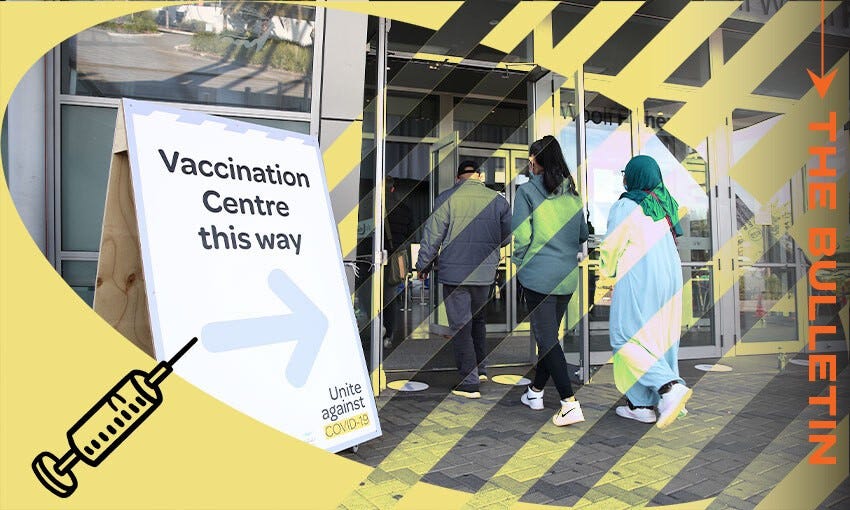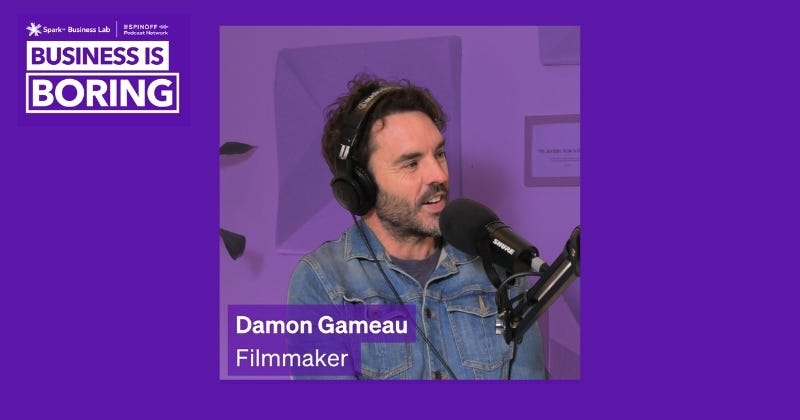Why Covid-19 is back in the headlines
A new variant, a rise in cases, and a reminder to get vaccinated.
Mōrena, and welcome to The Bulletin for Wednesday, May 29, produced in partnership with Blind Low Vision NZ.
In today’s edition: How Bill English ended up in charge of the Kāinga Ora review, “confusion” over a bill meant to help the media, and Mike King promises transparency over Gumboot Friday funding. But first, a rise in Covid-19 cases prompts a reminder from health experts.
We’re talking about Covid again
It’s been a while since Covid-19 was routinely in the news, and certainly a while since it’s been covered in depth by The Bulletin. But this week has seen the reappearance of headlines about the virus, as cold weather coupled with a spike in case numbers prompted a reminder from health experts to keep on top of vaccinations. Stuff has the key details here, showing the level of Covid-19 detected in wastewater for the week ending May 19 was twice as high as the week before – and the highest level detected since the end of 2022. Epidemiologist Michael Baker told RNZ’s First Up that hospitalisations were also surging. "We're up to about 35 people a day going to hospital with this infection," he said. In January, health minister Shane Reti confirmed free Rat tests would be available until the end of June, but with Covid restrictions no longer in place, people are no longer testing as diligently as they may have earlier in the pandemic. Millions of expired tests were disposed of late last year.
A new variant
With news of an uptick in cases comes questions over a new variant of the virus – “FLiRT”. Despite its name, there’s nothing appealing about FLiRT, as this piece from The Conversation explains. In short, the new variant is related to the highly infectious Omicron strain, which is the most dominant variant in many parts of the world. There is early, and not peer-reviewed, evidence that FLiRT may be better at evading immunity, and it could be even more transmissible than its predecessors as well. However, there’s no evidence it makes you sicker than other variants. Canterbury University professor Michael Plank told RNZ’s Checkpoint that the arrival of FLiRT and the rise in cases was bad timing as we head into winter, and recommended people get a booster vaccination.
Why can’t we all get a booster?
At the start of the month, the Herald’s Thomas Coughlan reported that Pharmac and Health NZ were considering the future direction of Covid-19 vaccinations and treatments in New Zealand, though no changes were imminent. We may hear more about this in Thursday’s budget. But one question I often hear is why younger people are still unable to access Covid boosters – even at a cost – as this 1News report notes. Under the current eligibility criteria, only those over 30 can receive an annual Covid booster (with some exceptions), which puts us at odds with countries like Australia that allow 12-monthly jabs for anyone over 18. A Pharmac spokesperson told The Bulletin that the agency currently has no plans to adjust the eligibility criteria, but did not respond to a follow-up question asking why.
What about long Covid?
Covid often cracks back into the news fleetingly when there’s a rise in cases or a new variant but for sufferers of long Covid, the after effects of the virus linger. Michael Baker described the dominant symptoms of long Covid as “fatigue and brain fog” in an interview with RNZ, adding there was also evidence of it causing heart attacks, strokes and diabetes. Newsroom’s Marc Daalder has reported extensively on the condition, including this 2022 long read that describes in stark detail the experience of living with long Covid, along with the effort to get help. RNZ’s Jemima Huston has also produced in-depth reports into living with the condition, like this from late 2023. While these reports illustrate the individual impact of long Covid, there’s so far been little in the way of action from the government, as outlined in this report by Daalder from April. New research on Covid-19 more broadly was released by the University of Otago. It urged increased use of face masks as one method of preventing people from developing long Covid – and staying safe from respiratory illnesses in general. Remember Bird Flu?
Join The Spinoff Welly 500
Last August, The Spinoff hired Joel MacManus as its first-ever Wellington editor. His agenda-setting editorial project on the future of housing in the city, the War for Wellington, was funded entirely by existing Spinoff members and supported by many new donors.
To sustain and grow our work in Wellington, we now need to ask Wellingtonians for help. The Spinoff is looking for 500 people to donate $50 or more and join a new community of supporters, The Spinoff Welly 500. Find out more or join today.
‘Confusion’ over media support bill
The government says it’s still considering the future of a proposed law that would help support media companies, despite “some confusion” at select committee yesterday. The Fair Digital News Bargaining Bill would force internet giants like Google to pay for the news content they use. As The Post’s Tom Pullar-Strecker reported, the select committee considering the bill recommended it should not be passed – though only Act has explicitly said it would kill it. The minister in charge, Paul Goldsmith, later said the government had not formally made a decision on the bill’s future. The Spinoff’s Duncan Greive has written extensively on the law and told me what happened yesterday initially sounded like the end of the road. “But given that only Act has come out full force against it, there’s life in it yet. Sources I’ve spoken to suggest that yesterday’s vote was somewhat chaotic, but that there remains a strong desire to do something for the ailing news media. In the absence of any better idea, an amended Fair Digital News Bargaining bill remains a decent shot at moving along,” he said. Goldsmith told The Bulletin that he couldn’t comment on cabinet processes and nor would he say whether tomorrow’s budget may bring any good news for media companies.
Meanwhile, in yesterday’s Bulletin we discussed the aging Broadcasting Act and questions over whether it should be updated. Goldsmith told me: “I am currently gathering a range of perspectives from the sector on all of the options and levers available to the government. We will consider those, and make decisions in due course.”
How Bill English ended up in charge of Kāinga Ora review
Newshub’s Jenna Lynch had an exclusive report last night, revealing that it took just a couple of texts to lock in former PM Bill English as head of the multimillion dollar review of housing agency Kāinga Ora. As Lynch reported, English was asked by housing minister Chris Bishop to lead the review in November last year, weeks before cabinet had signed it off. Bishop said the texts showed he was simply “expressing interest” in securing the former PM for the job, but Labour’s housing spokesperson Kieran McAnulty called it an “absolute stitch-up”. As we’ve discussed in The Bulletin, the Kāinga Ora review was highly critical of the agency and the government has since announced a complete refresh, including a new board and a renewed remit. Perhaps unsurprisingly, Kāinga Ora took issue, with the acting chair telling English there was “relatively limited engagement with our organisation”. Bishop told Newshub: “That's their perspective, it's not mine.”
The maker of ‘That Sugar Film’ on the power of dreams to fight climate change
Two months of eating supposedly healthy food led star actor Damon Gameau to fatty liver disease and a killer doco. More recently he's used "fact-based dreaming" to make “2040”, a film about a future where we've fixed climate change.
Damon joins Duncan Greive on Business is Boring to explain how he gets you to pay attention – even when you don't want to. Listen now. (sponsored)
Click and Collect
We talked last week about some of the concerns around Gumboot Friday and how it ended up with millions in government funding. On BusinessDesk (paywalled), Oliver Lewis speaks to Mike King, who promises transparency.
The government has confirmed $1.5m in support for Papua New Guinea after a devastating landslide that may have killed as many as 2,000 people. This piece from The Conversation on what causes landslides is also an interesting read.
A superb investigation from Stuff’s Paula Penfold looking into misconduct allegations and resignations at global accounting firm EY’s New Zealand branch.
Last month for The Spinoff, I wrote about a rent strike at Auckland University. The Herald follows up with some of the students refusing to pay for their student accommodation.
I always enjoy some Claire Trevett analysis. For the Herald this morning, she’s previewed tomorrow’s budget and looked at Nicola Willis’s decision to get the “bad numbers out of the way” ahead of time (paywalled). Sticking with the budget, The Spinoff’s Liam Rātana takes a look at National’s promised tax cuts and how we’ll know if they’re inflationary.
On Newsroom Pro (paywalled), Laura Walters looks at the impact of government cuts on disabled people.
What you need to know about Te Pāti Māori’s planned protests.
Shanti Mathias describes what we know about health spending in tomorrow's budget. Alex Casey kicks off another season of Married at First Sight NZ power rankings. Mad Chapman wonders why “container homes” are only uncool if poor people might live in them. Bookseller Melissa Oliver explains the BookTube, Bookstagram and BookTok phenomenons, and where you can find social media's best books content. With census results out today, demographer Paul Spoonley lays out the big trends to watch as New Zealand changes. For The Cost of Being, a reformed tightwad who loves making cocktails breaks down her expenses.
Capital picks, with Joel MacManus
Our Wellington editor shares his top stories from around the region.
Ray Chung has officially become the first contender for the Wellington mayoralty, tossing his hat into the ring against Tory Whanau. I took a closer look at his background and unpredictable term on council so far in my Windbag column.
Wellington City Council is making its final decisions on the Long Term Plan on Thursday. The timing means it will be probably drowned out by the government's budget. One of the big stories is whether the council will sell its minority stake in the airport. A council briefing last week said holding onto the shares could put the council in a perilous financial position. But as Erin Gourley reports, opponents have accused council officers of scaremongering.
Tory Whanau has put together a business advisory group with some high profile members. The move was praised in this NZ Herald editorial as a small win – and one that was much needed after the collapse of the Reading Cinema deal.
That’s it for this morning, thanks for reading. I’ll catch you back tomorrow.
Got some feedback about The Bulletin, or anything in the news? Get in touch with me at thebulletin@thespinoff.co.nz.
If you liked what you read today, share The Bulletin with friends, family and colleagues.


















Thanks for talking about Long Covid. I’ve had it for two years and it’s upended my life, as I’ve had to give up work, am too sick to socialise and can do minimal parenting. I just wish we had measures put in place to minimise the spread of Covid like air purifiers / good ventilation, especially in schools.